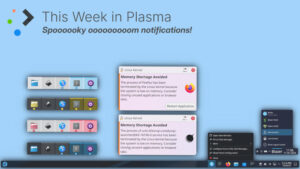Also included: FCC requires TP-Link to allow users to install open source firmware on routers, five new distro releases, new releases of LibreOffice and KDE Plasma, and Microsoft releases Skype 1.3 Alpha for Linux.
FOSS Week in Review
Maybe because we’re in the last 30 days or so of real summer — as opposed to calendar summer — or perhaps because most ‘Mericans are glued to their TVs as the Clinton/Trump heavyweight bout gets underway in earnest, but this has been a slow news week in the FOSS world. However, there are some notable items worth mentioning.
 FCC supports open source Wi-Fi firmware. For the last several months many open sourcers have been up in arms because it looked as if the door was being closed on open source on Wi-Fi routers after the agency changed it’s rules around radio interference on the 5 GHz band, making it difficult for router makers to allow users to install open source firmware on their routers. All along, the FCC claimed that shutting out open source use wasn’t part of the game plan, but we FOSSers are a suspicious lot and we weren’t buying it.
FCC supports open source Wi-Fi firmware. For the last several months many open sourcers have been up in arms because it looked as if the door was being closed on open source on Wi-Fi routers after the agency changed it’s rules around radio interference on the 5 GHz band, making it difficult for router makers to allow users to install open source firmware on their routers. All along, the FCC claimed that shutting out open source use wasn’t part of the game plan, but we FOSSers are a suspicious lot and we weren’t buying it.
This week the agency proved its case when it forced router maker TP-Link to support open source firmware on its routers. It seems the company got caught selling routers that allowed users to operate above legally allowed power levels, which resulted in a $200,000 fine along with a promise to not misbehave and abide by regulations in the future. As part of the settlement, the company also agreed to allow users to install open source firmware on its routers. The settlement will mean the company will have to design its routers so that firmware is unable to change the routers frequency in a way that could cause interference to devices such as Doppler radar.
IBM and open source: Ian Murphy reminded us on Linux.com this week that it’s been eighteen years since IBM made a big bet on Linux and open source which eventually resulted in Big Blue pouring at least a couple of billion dollars into Linux development.
Todd Moore, IBM’s vice president of open technology, talked about those early days in a keynot address at ApacheCon in May:
“We didn’t know how this was going to come out and we didn’t know if open source would grow. We knew there would be roadblocks and things we’d have to overcome along the way, but it had promise. We thought this would be the way of the future.”
Another day, another distro: Linux Mint 18 “Sarah” Xfce edition was released on Tuesday with the same new features found in the Cinnamon and Mate editions… Sunday saw the release of Simplicity Linux 16.07, which now gives users the choice of Puppy Linux or Debian based versions… SteamOS 2.87 was released on June 28, mainly with new proprietary drivers…. This week also saw the release of a couple of new ISO respins of rolling release distros: Arch 2016.08.01 and KaOS 2016.07.
Quick takes: As promised last week, LibreOffice 5.2 was released on Wednesday…. On Tuesday, KDE Plasma 5.7.3 was released, primarily containing bugfixes…. And for those who want a little Microsoft on their Linux, the release of Skype 1.3 Alpha for Linux was announced Sunday by Softpedia.
Parting shot: A tip of the Hatlo hat to Oliver Stone, who appears in a PSA asking cinema audiences to turn off their phones during the movie, which also doubles as a trailer for his upcoming biopic “Snowden.” In the sixty second clip, he also speaks to privacy issues associated with mobile phones.
“It allows certain parties to track your every move every time you make a call or send a text,” he says. “We are giving them access. The information you’ve put out into the world voluntarily is enough to burn your life to the ground. This will be our undoing.”
Well, that’s it. We’ve made it through another week. Until next time, may the FOSS be with you….
Christine Hall has been a journalist since 1971. In 2001, she began writing a weekly consumer computer column and started covering Linux and FOSS in 2002 after making the switch to GNU/Linux. Follow her on Twitter: @BrideOfLinux














I like to fart into my hand and throw it at people. Stone should make a movie about that. Seems that is the only way that the ignorant masses realize what actually goes on in this world.
The FCC got themselves into the 5Ghz mess due to their review process and opaquely written requirement; the original complaint about interference with navaids was suspicious because it wasn’t caused by a consumer router!
Moreover, OpenWRT usually has to control the wireless radios via the vendors proprietary binary ‘blob’ and so has limited (if any) ability to select an unauthorized frequency or power level.
At any rate TP-Link was just lazy, they could have split their firmware into three separate parts for the two radios and the routing functionality. Lock down the 5Ghz part and allow replacement of the others.
@mikef90000
It’s not quite that simple. It is possible with OpenWRT to select frequencies and power levels allowed by the hardware but disallowed in a region or country by messing with the regulatory domain. This is pure software, not a firmware blob. It’s more complicated than editing a config file but not too much more.